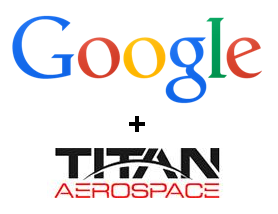Just a month ago, reports surfaced that Facebook was looking to acquire Titan Aerospace, maker of the Solara prototype drone, for $60 million. Then, Facebook acquired Ascenta, a Titan competitor and five-member team with experience at QinetiQ, Boeing, Honeywell and the Harris Corporation, with no mention of those acquisition talks with Titan. Now, Google has acquired Titan Aerospace for an undisclosed sum.
Facebook’s aim of drones is to support its Internet.org initiative, which brings Internet access to two-thirds of the world’s population that don’t yet have it. Google’s mission is similar – to expand the potential reach of its network with Project Loon – but it can also benefit from satellite imaging for Maps and help with disaster relief.
 “At Titan Aerospace, we’re passionate believers in the potential for technology (and in particular, atmospheric satellites) to improve people’s lives. It’s still early days for the technology we’re developing, and there are a lot of ways that we think we could help people, whether it’s providing internet connections in remote areas or helping monitor environmental damage like oil spills and deforestation. That’s why we couldn’t be more excited to learn from and work with our new colleagues as we continue our research, testing and design work as part of the Google family,” a post on Titan’s website reads.
“At Titan Aerospace, we’re passionate believers in the potential for technology (and in particular, atmospheric satellites) to improve people’s lives. It’s still early days for the technology we’re developing, and there are a lot of ways that we think we could help people, whether it’s providing internet connections in remote areas or helping monitor environmental damage like oil spills and deforestation. That’s why we couldn’t be more excited to learn from and work with our new colleagues as we continue our research, testing and design work as part of the Google family,” a post on Titan’s website reads.
The Solara platform from Titan is capable of supporting wide-range voice and data communications. It extends line of sight (LOS) radios to beyond line of sight (BLOS) communications using small, low-cost radio repeaters and specialty communication equipment on the Solara platform. The repeater receives the signals from transmitters on the selected radio frequency channel and then retransmits them on another frequency to a receiver. Users have full remote control capability of all functions, and voice and data can be retransmitted across a broad range of frequencies and waveforms.
Titan’s drones and Google’s technology will help increase the number of connected endpoints and areas with access to the Internet, which will only help further fuel and highlight the importance of the Internet of Things. Google’s already has its eye on this ecosystem with the acquisition of Nest earlier this year, but the deal with Titan means more focus on the satellite connectivity part of M2M.
Edited by
Alisen Downey





